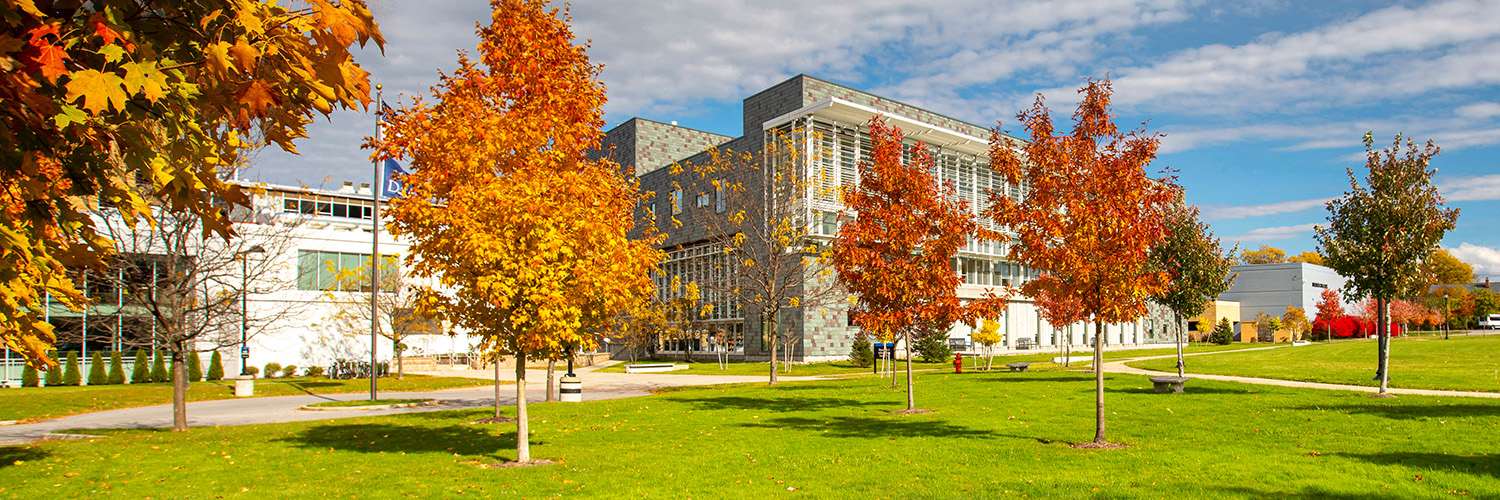The honors program meets the intellectual needs of Daemen University’s best students, ensuring that their collegiate experience challenges their minds and fosters their potential to contribute both to the community and to society at large. Students who have demonstrated excellence in learning can benefit from honors courses, which examine complex issues from multiple perspectives, use primary sources rather than textbooks, and present special opportunities for research. The program is overseen by the Honors Director, a six-member student governing board elected by members of the honors program, and an Honors Council comprising faculty representing the major academic areas of the university. Oversight includes evaluation of student applications, program assessment, review of proposed new colloquia, judgment of points accumulation, and matters relative to the final honors project
Program Requirements
To graduate with an honors degree, a student must complete 24 hours of honors coursework, including 12 hours of upper-division (300-400-level) coursework. Honors coursework may also fulfill requirements in the core, major, or minor. Students entering the program in the first year of college will earn six hours during the first semester through an honors section of the First Year Experience course and Honors Composition. Students may complete honors requirements by selecting courses from the following honors experiences:
- Contracted Courses: Honors students may receive honors credit for any regular undergraduate class offering by designing an honors contract with the professor. The contract must specify the type, nature, and purpose of additional research and assignments. If it is at all possible, the honors student’s work should contribute to the educational experience of the class in general, perhaps through an oral presentation to share the results of her/his research. The honors student must complete the contract in order to receive honors credit for the course. Contract forms are available in the Honors Center.
- Honors Colloquia: Honors colloquia are offered occasionally, dependent upon curricular restraints and the availability of faculty. Honors colloquia typically address topics that represent areas of faculty research and expertise or areas of student interest; they are distinct from a department’s usual course offerings. Colloquia are conducted in seminar (rather than in lecture) format and engage students in the advanced study of the topic, using primary texts and academic research methods.
- Honors Tutorials: In an honors tutorial, the student works one-on-one with a faculty member to design a course of study on a particular topic of student interest that is not a regular course offering. The student and faculty members work together to determine course readings, research methodology, and appropriate assignments.
- Opportunity for Study Abroad and/or Summer Institutes: Honors students are encouraged to take advantage of opportunities to study abroad and to attend summer institutes on other college campuses. Study abroad courses may be taken for honors credit, subject to the approval of the Global Programs Director and the Honors Council.
- Honors Project: Each honors student must conduct advanced research appropriate to her/his discipline, produce a project under the direction of a faculty advisor, and respond to the comments of a project committee (usually made up of three faculty members, including the advisor). It is expected that Honors Projects will be presented to the campus community at each year’s Academic Festival.
- Academic Expectations: Each member of the honors program will be expected to maintain a minimum grade point average (3.00 for freshmen and sophomores and 3.20 for juniors and seniors). Those whose average falls below the minimum will incur membership probation.
The Point System
Graduating with the honors designation indicates academic excellence, but it is also meant to reflect a student’s involvement in the program throughout a collegiate career. A points system has been implemented to encourage participation in events and activities beyond academic honors coursework. Event point values may vary depending on time requirements, and may even vary from semester to semester. If the student fails to accumulate the required amount of points in a semester, he or she will be placed on membership probation for the following semester. During a probation semester, the student will continue to attend meetings, complete honors classes or contracts, and earn points. Any student who fails to meet the point requirement for a second time is subject to termination from the honors program.
Student Honors Organization
Honors students oversee their own student organization, supported by the Student Association, to direct student activities on campus, including a film series, speakers, field trips, special campus events, and community service projects. The Student Honors Organization (SHO) elects officers as well as two representatives to the Honors Council. At the end of each academic year, the SHO publishes a newsletter representing the year’s accomplishments in honors. At an annual banquet for students, administrators, and faculty, the SHO presents three awards: a Student Research Award, a Friend of Honors Award, and a Faculty Award for superior teaching.
Benefits for Honors Students
Honors students have access to outstanding teachers in smaller class settings that offer the opportunity for advanced study through the use of primary texts and the development of special experiences to enhance learning. They also receive the following privileges:
- Priority registration by class rank (junior honors students before juniors, for example)
- Special residential accommodations;
- Honors facilities such as computers and study space in the Honors Center;
- Opportunity for travel to conferences;
- National Collegiate Honors Council recognition.
- Eligibility for existing scholarship programs, as well as encouragement to pursue national scholarships such as Truman, Marshall, Mellon, and Fulbright Scholarships.
